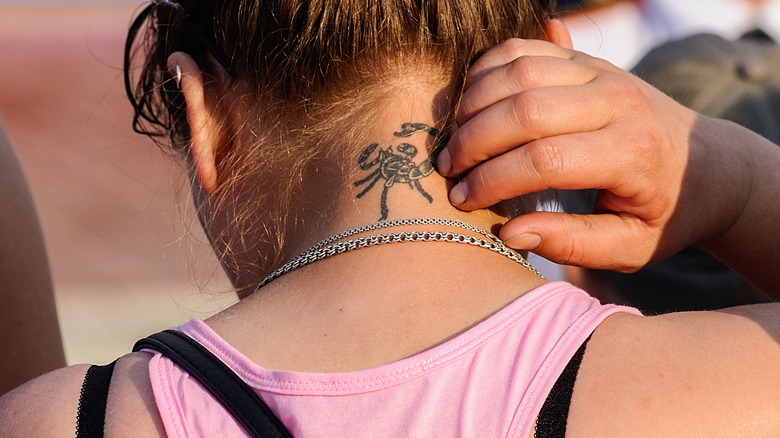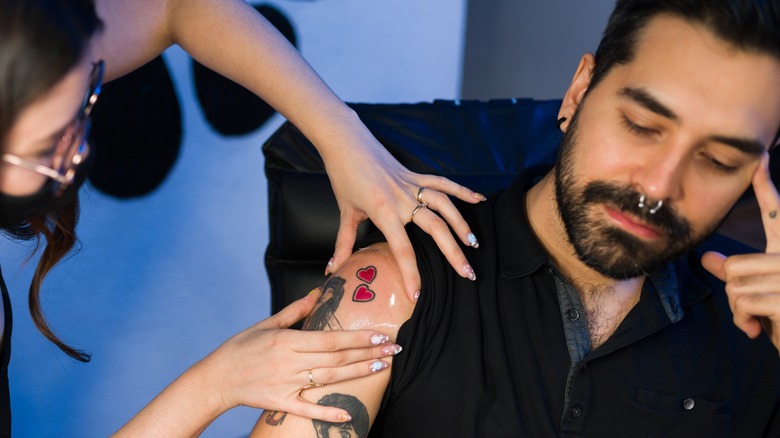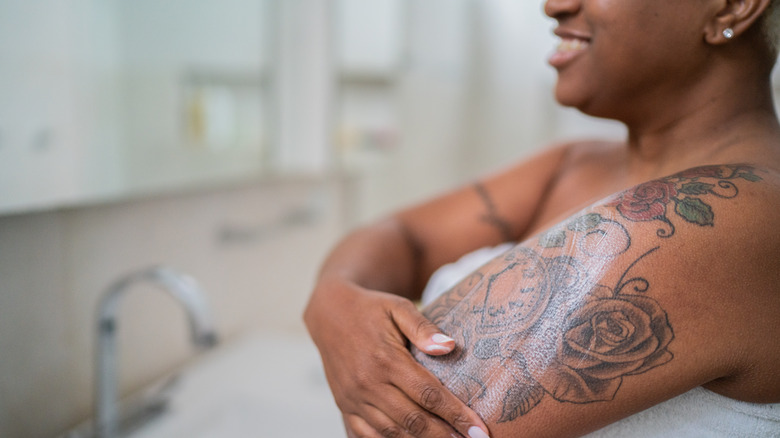What To Expect When Your Tattoo Begins Peeling
You're sporting a brand new art piece on the canvas that is your body, and now you want to do everything within your power to keep it in top condition. This includes being vigilant about proper tattoo aftercare in order to keep your skin safe and healthy and the design as bright and vibrant as possible.
When getting a tattoo, a needle is used to disperse ink into the body that reaches the first two layers of our skin: the epidermis and the dermis (via Medical News Today). Similar to a cut or scrape, this process damages the skin and can prompt swelling, redness, and inflammation, reports Byrdie. Afterwards, the body will require time to heal. Just how long the healing process takes, however, will depend on the intricacy of the tattoo.
"[For a] fine line tattoo, you might see [that] it starts to heal within a week," tattoo artist Joanna "JoJo" Roman told Cosmopolitan. "But for something that has a lot more ink deposited in the skin, you can expect about two or two and a half weeks for it to heal."
You may notice flakes, scabs, and itching
So what can we expect throughout the tattoo healing timeline? In the immediate aftermath of receiving a new tattoo, the fresh wound can feel quite sensitive. Soon after, however, some people may notice that their tattoo has begun to peel. The reason is that when skin has suffered damage, it becomes zapped of moisture (via Byrdie). This causes the skin to dry out, which can then lead to peeling. For some individuals, peeling may ramp up only after a few days (per Cosmopolitan), while for others, it may take up to two weeks before peeling kicks in.
As your tattoo begins to peel, it's safe to assume that you'll experience itching, flaking, and the development of scabs. There's no need to worry, though. This is simply our body going through the motions of properly mending itself. However, these side effects shouldn't be overly severe or long-lasting. If they persist for over two weeks, consider speaking with your tattoo artist.
Try not to touch a peeling tattoo
It's also important to note that not all tattoos will peel as they heal, so don't be concerned if no peeling occurs whatsoever (via Medical News Today). If you do experience peeling, however, refrain from pulling at the skin. Although tempting, doing so can mess with the look or vibrancy of the design. You also don't want to damage the skin any further and create an easy entryway for germs to make their way into the body.
Keeping the site clean is an important element of tattoo aftercare. To do so, lightly wash the area with fragrance-free, antibacterial soap on a routine basis. Afterwards, ensure the area stays hydrated by using water-based topical products over petroleum-based moisturizers, which can dull the color of a tattoo. Additionally, steer clear of tanning salons and be sure to limit time spent in the sun, as both can cause the tattoo to fade. When outdoors, use a broad-spectrum sunscreen with an SPF of at least 30, and be sure to lather on some more every couple hours.



